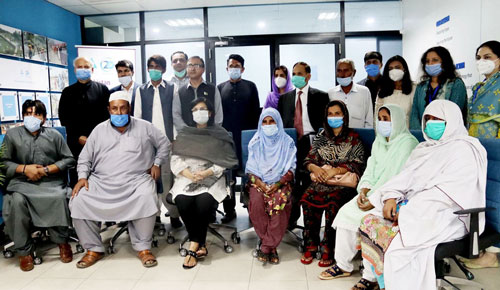Staff Reporter
Ehsaas hosted a high-level virtual event to celebrate the World Poverty Day that is being observed today. The event brought together four executing agencies of Poverty Alleviation and Social Safety Division (PASSD)- BISP, Pakistan Poverty Alleviation Fund (PPAF), Pakistan Bait-ul-Mal (OBM) and Trust for Voluntary Organizations (TVO) along with beneficiaries of various priority programs of Ehsaas.This was the first time in the history of the country that marginalized came to the table with the government and policy makers and gave valuable suggestions to make the Ehsaas strategy more responsive in the context of post Covid-19. SAPM Dr. Sania Nishtar moderated the session together with Secretary PASSD Muhammad Ali Shahzada.
The main highlight of the occasion was an engaging interaction with beneficiaries of various mainstream Ehsaas programs and initiatives particularly Ehsaas Kafaalat, Ehsaas Interest Free Loans, Ehsaas Amdan and Ehsaas Nashonuma. This session was followed by an insightful conversation with partner NGOs of TVO.
Connecting with Ehsaas beneficiaries, SAPM Dr. Sania Nishtar said, “Fighting poverty has always been one of the top priorities of our government. Ehsaas is fully determined to ensuringsocial and environmental protection for all. The growing recognition of the multi-dimensionality of poverty indicates that these two issues are inseparably interlinked, and that social protection cannot be fully grasped without addressing environmental issues at the same time.”
Adding further, she said, “At the core of each of the Ehsaas initiatives- Kafaalat, interest free loans, Amdan, undergraduate Scholarship, Nashonuma, emergency cash, Langars and Panagahs which fall under Ehsaas is the principle of inclusivity centered on social and environmental protection.”
Later in the day, Dr. Sania Nishtar visited Pakistan Poverty Alleviation Fund and Pakistan Bait-ul-Mal and spent the day with Ehsaas beneficiaries. Dr. Sania sat and interacted with them to gain insights on their aspirations and key problems being confronted by them. She listened to their concerns and assured full cooperation to address their problems. “To make the Ehsaas programme more responsive, the voices of the marginalized are critical”, she said.
“The cash disbursal arrangements were very well made at Ehsaas Emergency Cash campsites as compared to those at small retail outlets for Kafaalat”, said Memoona Bibi, a Kafaalat beneficiary from Peshawar.
Tahira Bibi, an Ehsaas interest free loan beneficiary from Layyah shared, “I want to act as a role model for women in my village to get them involved in income generation activities supported by Ehsaas poverty graduation programmes”.
Hakeem Khan, a beneficiary of Ehsaas Amdan fromBattagram has set up a small enterprise to generate income for his family. He said, “The rule-based procedures and demand driven approaches adopted under Ehsaas are highly commendable.”
“I am running an online trading business through a computer training provided to me under Ehsaas though Pakistan Bait-ul-Mal’s Women Empowerment Centre in Islamabad.” “With the support of Ehsaas”, she asserted, “we can tackle poverty”.











